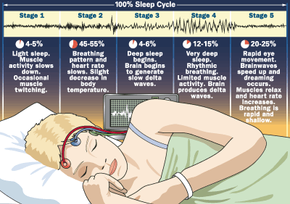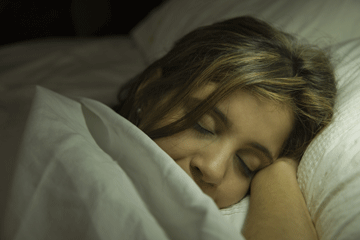Sleep is one of those funny things about being a human being -- you just have to do it. Have you ever wondered why? And what about the crazydreams, like the one where a bad person is chasing you and you can't run or yell. Does that make any sense?
If you have ever wondered about why people have to sleep or what causes dreams, then read on. In this article, you'll find out all about sleep and what it does for you.
Advertisement
Characteristics of Sleep
We all know how sleep looks -- when we see someone sleeping, we recognize the following characteristics:
- If possible, the person will lie down to go to sleep.
- The person's eyes are closed.
- The person doesn'thearanything unless it is a loud noise.
- The person breathes in a slow, rhythmic pattern.
- The person'smusclesare completely relaxed. If sitting up, the person may fall out of his or her chair as sleep deepens.
- 在睡眠过程中,人偶尔卷/ or rearranges his or her body. This happens approximately once or twice an hour. This may be the body's way of making sure that no part of the body or skin has its circulation cut off for too long a period of time.
In addition to these outward signs, theheartslows down and thebraindoes some pretty funky things (we'll get to this later).
In other words, a sleeping person is unconscious to most things happening in the environment. The biggest difference between someone who is asleep and someone who has fainted or gone into acomais the fact that a sleeping person can be aroused if the stimulus is strong enough. If you shake the person, yell loudly or flash a brightlight, a sleeping person will wake up.
For any animal living in the wild, it just doesn't seem very smart to design in a mandatory eight-hour period of near-total unconsciousness every day. Yet that is exactly whatevolutionhas done. So there must be a pretty good reason for it!
Reptiles, birds and mammals all sleep. That is, they become unconscious to their surroundings for periods oftime. Some fish and amphibians reduce their awareness but do not ever become unconscious like the higher vertebrates do. Insects do not appear to sleep, although they may become inactive in daylight or darkness.
By studying brainwaves, it is known that reptiles do not dream. Birds dream a little. Mammals all dream during sleep.
Different animals sleep in different ways. Some animals, like humans, prefer to sleep in one long session. Other animals (dogs, for example) like to sleep in many short bursts. Some sleep at night, while others sleep during the day.
Advertisement





